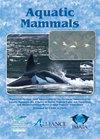First Humpback Whale Movement Between Ecuador and the South Sandwich Islands: Redefines the Easternmost Migration Point of Breeding Stock G
IF 0.8
4区 生物学
Q4 MARINE & FRESHWATER BIOLOGY
引用次数: 0
Abstract
The humpback whales ( Megaptera novaean-gliae ) of the Southern Hemisphere migrate long distances from their feeding grounds in Antarctic waters to the tropics (Matthews, 1937). At the end of the feeding season, each population (i.e., stock) migrates latitudinally towards the Equator to its own coastal or insular breeding ground in tropical or near-tropical waters. Seven humpback whale breeding stocks (A to G) and six management feeding areas (Areas I to VI) are recognized by the International Whaling Commission (IWC) (1998). Two breeding populations migrate along South America: Breeding Stock A is found in the coastal waters of Brazil, and Breeding Stock G is found on the west coast of South America from northern Peru to south Nicaragua (Pacheco et al., 2009; IWC, 2011; De Weerdt et al., 2020). These populations feed in two Antarctic management areas. Feeding Area I goes from 120° to 60° W (IWC, 2005). South Georgia ( ∼ 54° S, 36° W) and the South Sandwich Islands ( ∼ 58° S, 26° W) in the Scotia Sea, South Atlantic (Feeding Area II), are known feeding grounds for Breeding Stock A (Stevick et al., 2006; Zerbini et al., 2006, 2020; Engel et al., 2008; Engel & Martin, 2009; Marcondes et al., 2021), whereas the western Antarctic Peninsula (Feeding Area I)厄瓜多尔和南桑威奇群岛之间的首次座头鲸迁徙:重新定义繁殖种群G的最东迁徙点
南半球的座头鲸(Megaptera novaean gliae)从南极水域的觅食地迁移到热带地区(Matthews,1937)。在觅食季节结束时,每个种群(即种群)都会向赤道方向横向迁徙,到达热带或近热带水域的沿海或岛屿繁殖地。国际捕鲸委员会(IWC)承认了七个座头鲸繁殖种群(A至G)和六个管理饲养区(I至VI区)(1998年)。两个繁殖种群沿南美洲迁徙:繁殖种群A在巴西沿海水域发现,繁殖种群G在从秘鲁北部到尼加拉瓜南部的南美洲西海岸发现(Pacheco等人,2009年;IWC,2011年;De Weerdt等人,2020)。这些种群生活在两个南极管理区。进料区I从120°W变为60°W(IWC,2005)。南大西洋斯科舍海的南乔治亚岛(~54°S,36°W)和南桑威奇群岛(~58°S,26°W)(觅食区II)是已知的繁殖种群A的觅食地(Stevick et al.,2006;Zerbini et al.,20062020;Engel et al.,2008;Engel&Martin,2009;Marcondes et al.,2021),而南极半岛西部(觅食区I)
本文章由计算机程序翻译,如有差异,请以英文原文为准。
求助全文
约1分钟内获得全文
求助全文
来源期刊

Aquatic Mammals
MARINE & FRESHWATER BIOLOGY-ZOOLOGY
CiteScore
1.60
自引率
16.70%
发文量
99
审稿时长
>12 weeks
期刊介绍:
Aquatic Mammals is a peer-reviewed journal sponsored by the European Association for Aquatic Mammals (EAAM), the Alliance of Marine Mammal Parks and Aquariums (AMMPA), and the International Marine Animal Trainers’ Association (IMATA). Aquatic Mammals publishes articles related to marine mammals (whales, dolphins, seals, fur seals, sea lions, walrus, dugongs, manatees, sea otters, and polar bears). Topics of publication on both captive animals and wild marine mammals include aspects of husbandry; behavior; conservation; veterinary medicine; anatomy; physiology; training; population trends; and the effects of pollution, climate change, and noise.
 求助内容:
求助内容: 应助结果提醒方式:
应助结果提醒方式:


